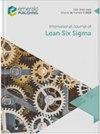Lean Six Sigma, effectiveness, and efficiency of internal auditing
IF 3.7
2区 工程技术
Q2 ENGINEERING, INDUSTRIAL
引用次数: 0
Abstract
Purpose In light of the recent changes in the internal audit (IA) landscape, the role of auditors has undergone a significant transformation. This paper aims to investigate the effects of applying Lean Six Sigma (LSS) techniques on the effectiveness and efficiency of IA. Design/methodology/approach The study used a quantitative approach, surveying Iranian internal auditors with a sample size of 384 participants. Data analysis involved confirmatory factor analysis and structural equation modeling. Findings The analyses demonstrate a significant association between LSS application and IA effectiveness and efficiency. In addition, an exploratory analysis indicates that the application of LSS techniques by less experienced internal auditors had a reverse effect on IA function quality as a component of IA competency. However, IA motivation factors, including education and position, did not mediate the impact of LSS on IA effectiveness and efficiency. Research limitations/implications This study was conducted with Iranian internal auditors, which may limit the generalizability of the findings to other countries. However, the primary academic implication of this research lies in its novel perspective on emphasizing the concept of continuous improvement in IA through the use of LSS techniques. By focusing on the need for internal auditors to add value to the business in new ways, this research contributes to the literature on IA quality. Practical implications This study has significant implications for the effective management of IA departments. By promoting the application of LSS techniques in IA, lean auditing is enhanced, and IA can create value by improving the quality of its functions. Moreover, IA regulators can benefit from this study as it emphasizes providing guidance and training on LSS techniques to enhance IA skills. Originality/value This research is pioneering in applying LSS methodology to enhance the effectiveness and efficiency of internal auditing. It also considers the integration of lean thinking into current audit practices, making it unique and valuable in internal auditing research.精益六西格玛、内部审计的有效性和效率
目的 鉴于内部审计(IA)领域最近发生的变化,审计人员的角色也发生了重大转变。本文旨在研究应用精益六西格玛(LSS)技术对内部审计有效性和效率的影响。研究采用定量方法,对伊朗内部审计师进行调查,样本量为 384 人。数据分析包括确证因子分析和结构方程建模。研究结果分析表明,LSS 应用与内审效果和效率之间存在显著关联。此外,一项探索性分析表明,经验不足的内部审计师应用 LSS 技术对作为内审能力组成部分的内审职能质量有反向影响。然而,包括教育程度和职位在内的内审动机因素并没有调节 LSS 对内审有效性和效率的影响。不过,本研究的主要学术意义在于,它以新颖的视角强调了通过使用 LSS 技术不断改进内审工作的理念。通过关注内部审计师以新的方式为业务增值的需求,本研究为有关内审质量的文献做出了贡献。通过在内审部门推广应用 LSS 技术,可以加强精益审计,内审部门可以通过提高其职能质量来创造价值。此外,内审监管机构也能从这项研究中受益,因为它强调提供有关精益管理技术的指导和培训,以提高内审技能。它还考虑了将精益思想融入当前审计实践的问题,使其在内部审计研究中具有独特性和价值。
本文章由计算机程序翻译,如有差异,请以英文原文为准。
求助全文
约1分钟内获得全文
求助全文
来源期刊

International Journal of Lean Six Sigma
Engineering-Industrial and Manufacturing Engineering
CiteScore
8.90
自引率
15.00%
发文量
46
期刊介绍:
Launched in 2010, International Journal of Lean Six Sigma publishes original, empirical and review papers, case studies and theoretical frameworks or models related to Lean and Six Sigma methodologies. High quality submissions are sought from academics, researchers, practitioners and leading management consultants from around the world. Research, case studies and examples can be cited from manufacturing, service and public sectors. This includes manufacturing, health, financial services, local government, education, professional services, IT Services, transport, etc.
 求助内容:
求助内容: 应助结果提醒方式:
应助结果提醒方式:


